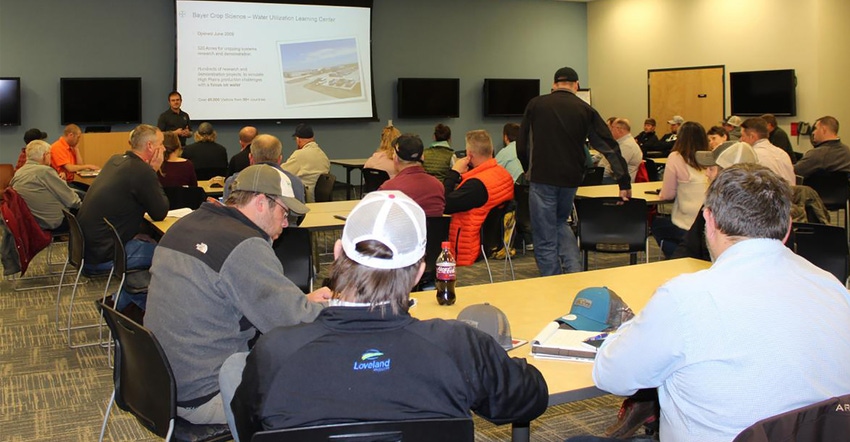April 17, 2019

By Krystle Rhoades
After being rescheduled because of weather concerns, the University of Nebraska-Lincoln Testing Ag Performance Solutions program kicked off its 2019 competitions March 19 at the Bayer Crop Science Water Utilization Learning Center.
More than 60 competitors and industry sponsors attended the event highlighting the center and its research on subsurface drip irrigation.
Mark Reiman, learning center agronomist, presented information about the center and its research and technology focus on efficient nitrogen and water use.
Reiman said "as a whole, the market development group in Bayer Crop Science is really working to help producers with the information they need to help select proper seed products, seeding rates, manage weeds, manage disease, and a host of other topics," which aligns with the mission of the UNL-TAPS program.
Reiman said the best part of hosting the UNL-TAPS group was meeting the participants, who are "a very diverse group spread geographically throughout the state that come to the contest with their own unique set of experiences, ideas and plans for the contest."
This year, the TAPS program is expanding by adding a subsurface drip irrigation competition. Eco-Drip of Hastings, Neb., donated, designed and installed an SDI system at the West Central Research and Extension Center in North Platte, Neb., for use in the TAPS Farm Management Competition.
The inaugural SDI competition is full, with 16 teams ranging from current SDI producers wanting to evaluate their management strategies against their peers and university recommendations, to producers interested in adopting SDI to demonstrate and learn how to manage it before adopting it on their own operations, as well as some industry teams looking to gain insight on the expanding SDI technology.
"I think for all producers it will be a unique chance to see how [SDI] water and nitrogen use efficiency compare to standard sprinkler irrigation," Reiman said.
Record participation
The other two TAPS competitions — irrigated corn and irrigated sorghum production — are continuing from previous years. This year, the corn contest will have 23 teams from throughout Nebraska, as well as competitors from Kansas, Colorado and Missouri. The sorghum contest will include 10 teams, also from Nebraska, Colorado and Kansas.
More than 100 participants on 49 teams are signed up to compete. This is the largest number in the three years of the program.
Reiman, who has been involved with the TAPS program in the past, said the benefit to participating producers is "getting a chance to make decisions, and sometimes more risky decisions than they would normally make, without a direct financial impact on their farm."
Participants can test different methods and technologies than they might use on their own operation with the UNL team making the applications and providing data on results at the end of the season.
"I think in that environment you have a sandbox to play in, and then eventually move the practices out to your larger farming operation to monetize the benefits of what you learned," Reiman said.
Oklahoma State program models UNL-TAPS
This year, UNL-TAPS organizers helped start a similar program with Oklahoma State University — OSU-TAPS. It is being hosted at the McCaull Research and Demonstration Farm in Eva, Okla., 30 miles northwest of Goodwell in the Oklahoma Panhandle.
Modeled after UNL-TAPS, six farmer-led teams are participating this year in the OSU inaugural sprinkler corn competition, along with three university staff-led teams. Aside from limiting participants to one corn variety, OSU-TAPS participants will follow the same competition format as UNL-TAPS, making decisions on seed population density, nitrogen and water timing and rate, crop insurance, and marketing for replicated plots under a variable rate irrigation-equipped pivot.
One of the OSU-TAPS lead coordinators, OSU Extension specialist Jason Warren, noted that "even with just six farmers participating, the group is very diverse."
Since their kickoff Feb. 28, OSU-TAPS participants have submitted marketing decisions and initial preplant fertilizer requests.
"Each one of these guys is going to do something different,” Warren said. “We've just got to wait for it to stop raining and for the ground to dry out to get rolling.”
Rhoades is the UNL TAPS program coordinator.
This report comes from UNL CropWatch, which is solely responsible for the information provided and is wholly owned by the source. Informa Business Media and all its subsidiaries are not responsible for any of the content contained in this information asset.
You May Also Like




